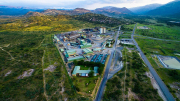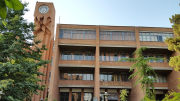
Russia is "changing deckchairs on the Titanic" rather than working to overturn an international ban on its athletes, ex-World Anti-Doping Agency (WADA) president Dick Pound told AFP on Wednesday.
Russian athletes were banned from competing internationally last year after an independent commission chaired by Pound found evidence of state-sponsored doping in the country.
The country still hopes to participate at this year's Olympic Games in Rio de Janeiro, but Pound says that there remains a "wall of denial" about the extent of doping in Russian sport.
"We said at the time, you're not going to like much of what we say about athletics in your country," the Canadian lawyer told AFP during the Tackling Doping in Sport Conference at London's Twickenham Stadium.
"It's likely that you'll be suspended or sanctioned in some way. If you want to be in Rio, you're really going to have to address all these issues quickly and thoroughly and don't waste your time denying the findings or saying the recordings were illegally made under Russian law.
"That's all been dealt with. Get on with getting things cleaned up. We thought it would be a stretch, but nevertheless possible.
"I think there's been a lot of slippage. The most recent programme on (German television channel) ARD suggests they've just changed some deckchairs on the Titanic.
"If that's the case, and you're putting in new people who were connected with the old system, it's going to be very difficult for both the IAAF (International Association of Athletics Federations) and WADA to say the problems have been solved."
He added: "My guess is that Russia may not make it back for Rio. The IAAF and WADA are not going to risk their reputations by rolling over and playing dead."
Speaking at the same event, WADA's current president Craig Reedie urged the Russian Anti-doping Agency (RUSADA) to allow two independent experts to enter the country to help it sort out its anti-doping programme.
- 'Cat-and-mouse' -
"The single most important thing that needs to be done is an agreement with RUSADA at the earliest possible moment that they will fund two independent experts to go and live in Moscow and actually rebuild RUSADA," he told journalists.
Reedie also said that WADA is prepared to follow up its investigation into doping in Russian athletics by probing other sports in the country.
United States-based Russian tennis superstar Maria Sharapova is facing a ban after testing positive for the banned drug meldonium and Reedie said that WADA would not hesitate to probe doping allegations in other sports.
"If evidence comes to light as part of the independent testing programme under way in Russia and our discussions with RUSADA and if those discussions warrant further investigation, then we will take action," he said.
Reflecting on a year that also saw football's governing body FIFA plunged into a corruption scandal, Reedie said: "The public's confidence in sport was shattered in 2015 like never before.
"The public mood has soured, cynicism has prevailed and there's a general feeling that they're all at it."
Reedie called for more investment in anti-doping programmes by sport's governing bodies, saying he was "perplexed the sports movement is reluctant to provide the investment required".
Pound warned that there were likely to be more bombshells about doping in sport ahead.
"It's entirely possible that there's more (doping going on)," he told AFP.
"We haven't looked at some of the countries where there are known problems: Morocco, Spain, Belarus, Ukraine, all of these countries.
"So there may be more and they may be different substances or procedures being used. There may have to be investigations in those countries to be sure.
"We're getting better at our job. But that forces the cheater to become better at their job, and the cat-and-mouse game will go on." afp








































